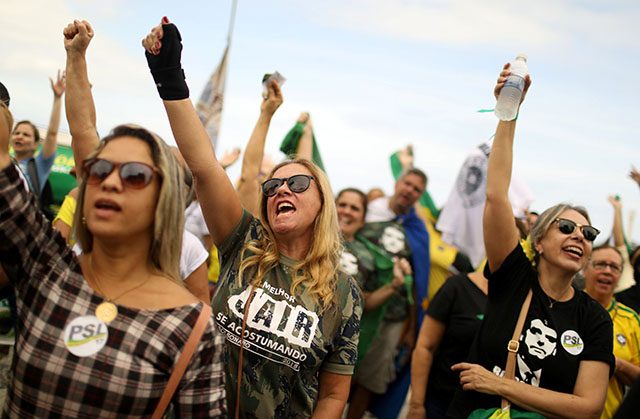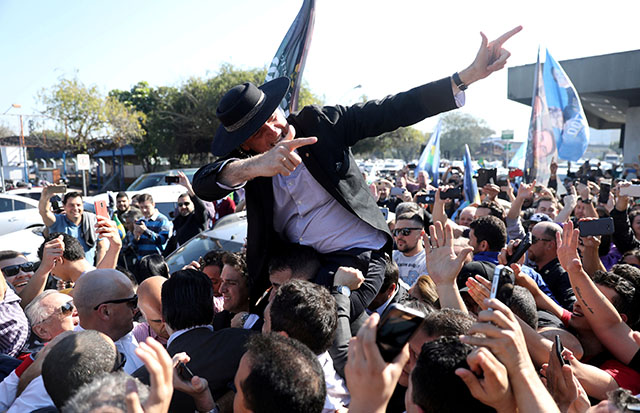
RIO DE JANEIRO/BRASILIA — Luzia Amaral took a long hard look at Brazil’s presidential candidates, and eventually settled on far-right Jair Bolsonaro, viewing him as the only option to prevent the return of the leftist Workers Party (PT) in this weekend’s vote.
Amaral is part of a growing number of women who opinion polls show have recently warmed to Bolsonaro, a divisive candidate whose comments belittling rape and defending the gender pay gap have long alienated many female voters.
If the trend continues, some of the women who previously balked at the former army captain could help propel him to the presidency, and possibly a first-round victory on Sunday, pollsters and analysts say.
That prospect cheers investors who fear a return of the PT’s state-run policies, but terrifies Bolsonaro’s critics, who say his views echo those of U.S. President Donald Trump or even hardline Philippine President Rodrigo Duterte.
Amaral said she was not thrilled by Bolsonaro’s pledge to loosen gun laws and disliked his homophobic statements, but ultimately she was willing to overlook those if he was able to beat PT candidate Fernando Haddad.
“In truth, my vote is a protest vote,” said Amaral, a 64-year-old retired civil servant in downtown Rio de Janeiro. “Right now, among the current crop of candidates, none of them would be my choice to govern the country.”
After ruling Brazil for 13 of the last 15 years, the PT is blamed by many for a crippling recession, rising violence and voracious corruption.
An Ibope poll released on Wednesday night showed Bolsonaro with a strong first-round lead over second-placed Haddad.
That survey and others indicate that a run-off vote between the two, which would take place on Oct. 28 if nobody clinches a majority on Sunday, would be close.
The signs that Bolsonaro is gaining momentum led Brazil’s stock index up to a near five-month high and its currency to its strongest level in almost two months on Wednesday.

“(The polls are) bringing euphoria to the market … which is already beginning to price in the possibility of a (Bolsonaro) victory in the first round,” said currency strategist Fernanda Consorte from bank Ourinvest.
Rising female support
Bolsonaro’s support among women has risen some 6 percentage points in the last week alone, the polls suggest.
That is all the more surprising given it comes just days after his candidacy provoked the largest female-led street demonstrations Brazil has seen in decades.
Far from slowing Bolsonaro, a federal congressman who was hospitalized for much of September after being stabbed in an assassination attempt, the protests appear to have helped him, particularly among some women who viewed the young, progressive protesters as PT supporters.
Luzinete Silva, a 55-year-old lawyer in Rio who recently decided to vote for Bolsonaro, said the women who participated in the marches were “misinformed.”
“I don’t think those women are well-educated and they’re not looking at and reading (Bolsonaro’s) proposals and analyzing what’s going on in the whole country,” she said.
Nobody has won the presidency in Brazil in the first round since 1998.
But sudden last-minute waves of anti-PT sentiment have impacted recent local elections, such as Joao Doria’s landslide first-round victory over Haddad to become mayor of Sao Paulo in 2016.
Bolsonaro’s chances of winning on Sunday would be boosted if there is high abstention, and if many voters cast blank or spoiled ballots, said Leonardo Barreto, head of Brasilia-based political consultancy Factual.
“If the trends detected by Ibope and Datafolha this week continue with further growth for Bolsonaro, we could have a final wave of support for him,” said Barreto. — Reporting by Gabriel Stargardter in Rio and Anthony Boadle in Brasilia; Additional reporting by Claudia Violante in Sao Paulo; Editing by Brad Brooks and Rosalba O’Brien









